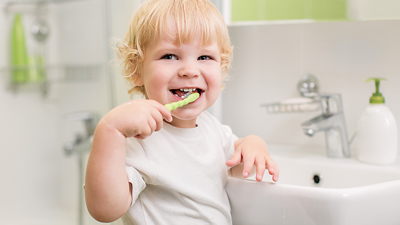Would you have guessed that tooth decay is considered the single most common disease facing America’s children? Five times more common than asthma, nearly 4.5 million children (more than 25 percent) in the U.S. experience tooth decay. Of these, three million children have never sought dental treatment. This is a worrisome trend that is growing among families with toddlers
and preschoolers.
While dental decay is complicated, there is a misguided belief when it comes to children’s cavities. Many parents will say, They are just baby teeth. They will fall out. The truth is, untreated dental decay can not only lead to pain and swelling, but can also impact a child’s ability to eat and sleep, grow and develop, and concentrate and learn in school. The just-baby-teeth argument doesn’t hold true, as research has shown that children with cavities are more likely to become adults with cavities.
While treatment is often necessary to tackle dental decay, the best and least traumatic approach for children is prevention. Here are some tips to help put an end to your child’s tooth decay by preventing it in the first place.
1. Start early.
It is now recommended that children visit the pediatric dentist for their initial checkup at age one or within 6 months of their first teeth coming in. The old notion that the first dental visit occurs at age three is problematic, as many of these children are seen with a mouth full of cavities. Unlike the 3-year-old who may already have decay, your 1-year-old can have a positive, cavity-free experience in a kid-friendly environment that is comfortable and fun.
2. Avoid risky behaviors.
Children are not just small adults. They are unique in many ways, including their age-specific risk factors that lead to decay. Cavities can be prevented by limiting some of these risky behaviors:
• Avoid late-night feedings. Putting a child to bed with a bottle of formula or milk, or casual nighttime breastfeeding are leading causes of cavities on a child’s front teeth. It is recommended that a child receive nothing but water after brushing their teeth before bed. If breastfeeding occurs throughout the night, parents should try to wipe off the child’s teeth and gums with a warm rag when possible.
• Limit the exposure your infant will have to cavity-causing bacteria. You can transfer bacteria from your mouth to your infant’s mouth and put children at greater risk for developing cavities. Therefore, take extra caution to not clean the pacifier, bottle nipple, or spoon in your own mouth before giving it back to your baby.
• Keep the surfaces of your child’s teeth clean. By brushing your child’s teeth two times a day with a pea-size amount of fluoridated toothpaste and flossing once a day when the teeth are touching, you are improving their chances of not developing a cavity.
• Decrease the frequency of sugary drinks. Highly acidic, sugary drinks, such as juice, sodas, and sweet tea are just as problematic as candies and often more accessible. From juice boxes to sippy cups, these drinks have the potential to attack teeth with sugar all day long. It is best to avoid these drinks altogether. If your child has one, limit it to mealtime only once a day. By replacing these drinks with water and milk, your child will be less likely to get cavities.
3. Consume a healthy diet.
The sugar-containing foods and drinks that cause cavities are the same ones causing an increase in childhood obesity. Dietary habits are established in the first two years of life, so make it a family affair. Your kids eat what you eat, so try to eat healthier together. By eating a well-balanced diet with plenty of vegetables, whole grains, fruits, and foods low in saturated fat and cholesterol, you and your child will be on your way to better overall health and preventing cavities before they begin.





